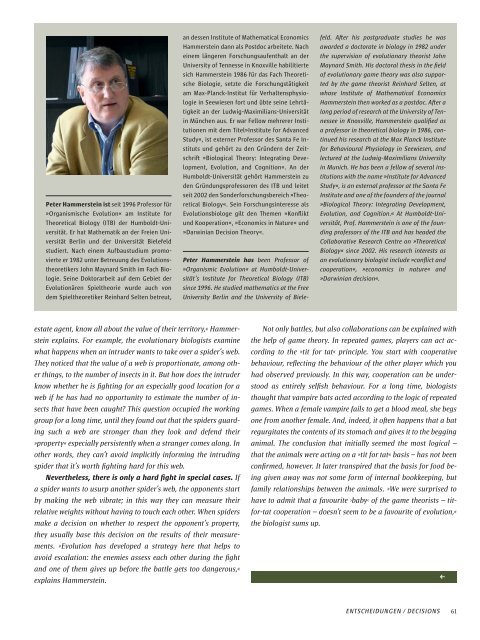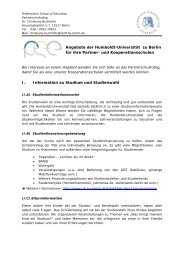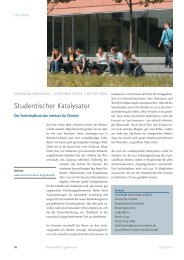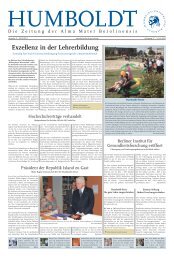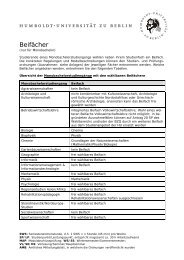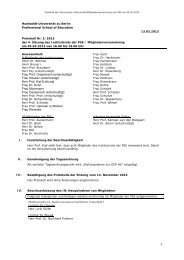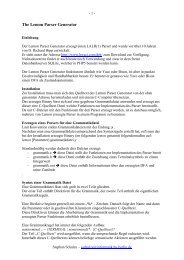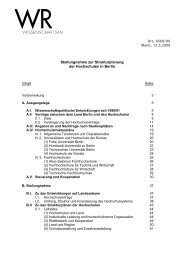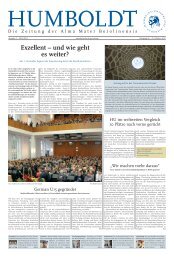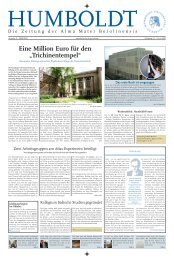hu wissen 1 (pdf) - Humboldt-Universität zu Berlin
hu wissen 1 (pdf) - Humboldt-Universität zu Berlin
hu wissen 1 (pdf) - Humboldt-Universität zu Berlin
Erfolgreiche ePaper selbst erstellen
Machen Sie aus Ihren PDF Publikationen ein blätterbares Flipbook mit unserer einzigartigen Google optimierten e-Paper Software.
Peter Hammerstein ist seit 1996 Professor für<br />
»Organismische Evolution« am Institute for<br />
Theoretical Biology (ITB) der <strong>Humboldt</strong>-Universität.<br />
Er hat Mathematik an der Freien Universität<br />
<strong>Berlin</strong> und der Universität Bielefeld<br />
studiert. Nach einem Aufbaustudium promovierte<br />
er 1982 unter Betreuung des Evolutionstheoretikers<br />
John Maynard Smith im Fach Biologie.<br />
Seine Doktorarbeit auf dem Gebiet der<br />
Evolutionären Spieltheorie wurde auch von<br />
dem Spieltheoretiker Reinhard Selten betreut,<br />
an dessen Institute of Mathematical Economics<br />
Hammerstein dann als Postdoc arbeitete. Nach<br />
einem längeren Forsc<strong>hu</strong>ngsaufenthalt an der<br />
University of Tennesse in Knoxville habilitierte<br />
sich Hammerstein 1986 für das Fach Theoretische<br />
Biologie, setzte die Forsc<strong>hu</strong>ngstätigkeit<br />
am Max-Planck-Institut für Verhaltensphysiologie<br />
in Seewiesen fort und übte seine Lehrtätigkeit<br />
an der Ludwig-Maximilians-Universität<br />
in München aus. Er war Fellow mehrerer Institutionen<br />
mit dem Titel»Institute for Advanced<br />
Study«, ist externer Professor des Santa Fe Instituts<br />
und gehört <strong>zu</strong> den Gründern der Zeitschri<br />
»Biological Theory: Integrating Development,<br />
Evolution, and Cognition«. An der<br />
<strong>Humboldt</strong>-Universität gehört Hammerstein <strong>zu</strong><br />
den Gründungsprofessoren des ITB und leitet<br />
seit 2002 den Sonderforsc<strong>hu</strong>ngsbereich »Theoretical<br />
Biology«. Sein Forsc<strong>hu</strong>ngsinteresse als<br />
Evolutionsbiologe gilt den Themen »Konflikt<br />
und Kooperation«, »Economics in Nature« und<br />
»Darwinian Decision Theory«.<br />
Peter Hammerstein has been Professor of<br />
»Organismic Evolution« at <strong>Humboldt</strong>-Uni versität‘s<br />
Institute for Theoretical Biology (ITB)<br />
since 1996. He studied mathematics at the Free<br />
University <strong>Berlin</strong> and the University of Bielefeld.<br />
Aer his postgraduate studies he was<br />
awarded a doctorate in biology in 1982 under<br />
the supervision of evolutionary theorist John<br />
Maynard Smith. His doctoral thesis in the field<br />
of evolutionary game theory was also supported<br />
by the game theorist Reinhard Selten, at<br />
whose Institute of Mathematical Economics<br />
Hammerstein then worked as a postdoc. Aer a<br />
long period of research at the University of Tennessee<br />
in Knoxville, Hammerstein qualified as<br />
a professor in theoretical biology in 1986, continued<br />
his research at the Max Planck Institute<br />
for Behavioural Physiology in Seewiesen, and<br />
lectured at the Ludwig-Maximilians University<br />
in Munich. He has been a fellow of several institutions<br />
with the name »Institute for Advanced<br />
Study«, is an external professor at the Santa Fe<br />
Institute and one of the founders of the journal<br />
»Biological Theory: Integrating Development,<br />
Evolution, and Cognition.« At <strong>Humboldt</strong>-Universität,<br />
Prof. Hammerstein is one of the founding<br />
professors of the ITB and has headed the<br />
Collaborative Research Centre on »Theoretical<br />
Biology« since 2002. His research interests as<br />
an evolutionary biologist include »conflict and<br />
cooperation«, »economics in nature« and<br />
»Darwinian decision«.<br />
estate agent, know all about the value of their territory,« Hammerstein<br />
explains. For example, the evolutionary biologists examine<br />
what happens when an intruder wants to take over a spider’s web.<br />
They noticed that the value of a web is proportionate, among other<br />
things, to the number of insects in it. But how does the intruder<br />
know whether he is fighting for an especially good location for a<br />
web if he has had no opportunity to estimate the number of insects<br />
that have been caught? This question occupied the working<br />
group for a long time, until they found out that the spiders guarding<br />
such a web are stronger than they look and defend their<br />
»property« especially persistently when a stranger comes along. In<br />
other words, they can’t avoid implicitly informing the intruding<br />
spider that it’s worth fighting hard for this web.<br />
Nevertheless, there is only a hard fight in special cases. If<br />
a spider wants to usurp another spider’s web, the opponents start<br />
by making the web vibrate; in this way they can measure their<br />
relative weights without having to touch each other. When spiders<br />
make a decision on whether to respect the opponent’s property,<br />
they usually base this decision on the results of their measurements.<br />
»Evolution has developed a strategy here that helps to<br />
avoid escalation: the enemies assess each other during the fight<br />
and one of them gives up before the battle gets too dangerous,«<br />
explains Hammerstein.<br />
Not only battles, but also collaborations can be explained with<br />
the help of game theory. In repeated games, players can act according<br />
to the »tit for tat« principle. You start with cooperative<br />
behaviour, reflecting the behaviour of the other player which you<br />
had observed previously. In this way, cooperation can be understood<br />
as entirely selfish behaviour. For a long time, biologists<br />
thought that vampire bats acted according to the logic of repeated<br />
games. When a female vampire fails to get a blood meal, she begs<br />
one from another female. And, indeed, it oen happens that a bat<br />
regurgitates the contents of its stomach and gives it to the begging<br />
animal. The conclusion that initially seemed the most logical –<br />
that the animals were acting on a »tit for tat« basis – has not been<br />
confirmed, however. It later transpired that the basis for food being<br />
given away was not some form of internal bookkeeping, but<br />
family relationships between the animals. »We were surprised to<br />
have to admit that a favourite ›baby‹ of the game theorists – titfor-tat<br />
cooperation – doesn’t seem to be a favourite of evolution,«<br />
the biologist sums up.<br />
v<br />
ENTSCHEIDUNGEN / DECISIONS<br />
61


